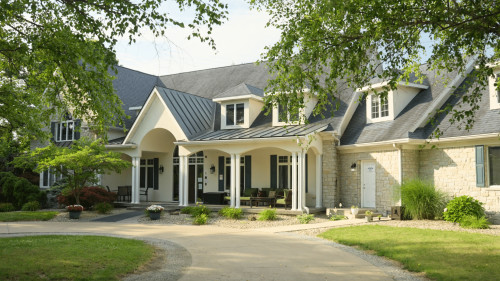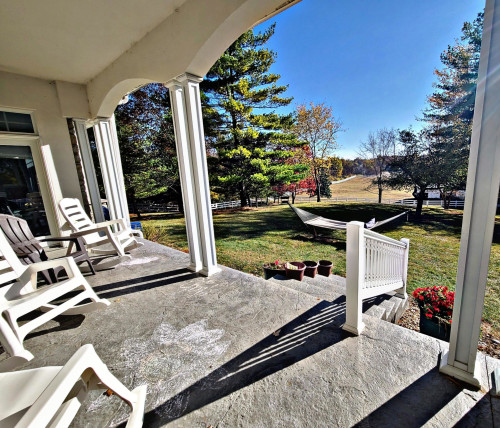






Selah House
Treatment Focus
You can get treatment for eating disorders at this center, helping you navigate symptoms, build coping tools, and restore your physical health under expert care.
Primary Level of Care
Offering intensive care with 24/7 monitoring, residential treatment is typically 30 days and can cover multiple levels of care. Length can range from 14 to 90 days typically.
This provider hasn't verified their profile's information. Are you the owner of this center? Claim your listing to better manage your presence on Recovery.com.
Treatment Focus
You can get treatment for eating disorders at this center, helping you navigate symptoms, build coping tools, and restore your physical health under expert care.
Primary Level of Care
Offering intensive care with 24/7 monitoring, residential treatment is typically 30 days and can cover multiple levels of care. Length can range from 14 to 90 days typically.
Provider's Policy
At Selah House, we work with all commercial insurance companies and are in-network with several health plans, including CareSource, Parkview Signature Care, and Physicians Health Plan of Northern Indiana. Call us to confirm your coverage.
Selah House
Selah House
About Selah House
Surrounded by 78 acres of peaceful Indiana countryside, Selah House provides a serene setting for adolescent girls and adult women ages 12 and up. The facility offers faith-based care for anorexia nervosa, bulimia nervosa, and other eating disorders. As part of Odyssey Eating Disorder Network, a nationwide network specializing in evidence-based care for eating disorders—Selah House provides a full continuum of care, bridging gaps in recovery with personalized support and expert clinicians.
Therapy and Life Skills in One Place
The facility offers comprehensive care options, from round-the-clock inpatient treatment to structured day programs. A vital part of treatment involves helping each client rebalance their relationship with food, their mind and body, and their soul through their Care Through Culinary program.Clients participate in individual and group therapies, equine-assisted therapy, spiritual care, meal planning and hands-on culinary experiences.
A Lasting Community Beyond Treatment
Clients live in warm, homelike settings with shared rooms, fully equipped kitchens, and inviting indoor and outdoor lounges that encourage connection. Days are grounded in peaceful experiences like equine programs and wooded trail walks. Teens continue their schooling with on-site education, while families take part in weekly therapy and healing-focused activities that strengthen recovery at home. After treatment, Selah House fosters ongoing connection through weekly alumni and family support groups, recovery-focused events, and online communities. Through personalized aftercare planning, clients are guided as they transition home, never walking the road to recovery alone.

Center Overview
Treatment Focus
You can get treatment for eating disorders at this center, helping you navigate symptoms, build coping tools, and restore your physical health under expert care.
CARF Accredited
CARF stands for the Commission on Accreditation of Rehabilitation Facilities. It's an independent, non-profit organization that provides accreditation services for a variety of healthcare services. To be accredited means that the program meets their standards for quality, effectiveness, and person-centered care.

Insurance Accepted
Levels of Care




Treatment
Specializations
Adolescents
Teens receive the treatment they need for mental health disorders and addiction, with the added support of educational and vocational services.
Eating Disorders
An eating disorder is a long-term pattern of unhealthy behavior relating to food. Most people with eating disorders have a distorted self-image.
Who We Treat
Adolescents
Teens receive the treatment they need for mental health disorders and addiction, with the added support of educational and vocational services.
Women only
Women attend treatment in a gender-specific facility, with treatment delivered in a safe, nourishing, and supportive environment for greater comfort.
Approaches
Spiritual Emphasis
Spirituality connects patients to a higher power and helps strengthen their recovery, hope, and compliance with other treatment modalities.
Christian
Through surrender and commitment to Christ, patients refocus the efforts and source of their recovery with clinical and spiritual care.
Gender-Specific
Separate treatment for men or women can create strong peer connections and remove barriers related to trauma, shame, and gender-specific nuances.
Therapies
1-on-1 Counseling
Patient and therapist meet 1-on-1 to work through difficult emotions and behavioral challenges in a personal, private setting.
Art Therapy
Visual art invites patients to examine the emotions within their work, focusing on the process of creativity and its gentle therapeutic power.
Body Image Therapy
Therapists use cognitive behavior techniques to challenge how patients perceive their body and their worth, rewriting negative thoughts and attitudes.
Equine Therapy
Guided interactions with trained horses, their handler, and a therapist can help patients improve their self-esteem, trust, empathy, and social skills.
Experiential Therapy
With this approach, patients heal by doing. Therapists help patients process difficult emotions to speak, using guided activities like art or dance.
Family Therapy
Family therapy addresses group dynamics within a family system, with a focus on improving communication and interrupting unhealthy relationship patterns.
Mindfulness-Based Cognitive Therapy
MBCT combines mindfulness practices—like meditation—with cognitive therapy techniques to help patients work through negative thought patterns.
Nutrition Counseling
Nutritious food helps patients heal from within, setting them up for mental and bodily wellness as they learn about healthy eating.
Recreation Therapy
In recreation therapy, recovery can be joyful. Patients practice social skills and work through emotional triggers by engaging in fun activities.
Conditions We Treat
Eating Disorders
An eating disorder is a long-term pattern of unhealthy behavior relating to food. Most people with eating disorders have a distorted self-image.
Languages
Aftercare
Experience
Personal Amenities
Amenities
Special Considerations
Gender-specific groups
Patients in gender-specific groups gain the opportunity to discuss challenges unique to their gender in a comfortable, safe setting conducive to healing.
Healthy Meals are provided
Great food meets great treatment, with providers serving healthy meals to restore nutrition, wellbeing, and health.
Activities
Yoga
Yoga is both a physical and spiritual practice. It includes a flow of movement, breathing techniques, and meditation.

What people are saying
Accommodations
Food & Nutrition
Treatment
Value
Pros
- Beautiful Location (2)
- Excellent & Effective Treatment Programming (2)
- Treated With Respect (2)
EB
H.
We love hearing about your treatment experience
Help individuals and families seeking treatment by sharing your first-hand experience with this treatment provider. Review Guidelines.





